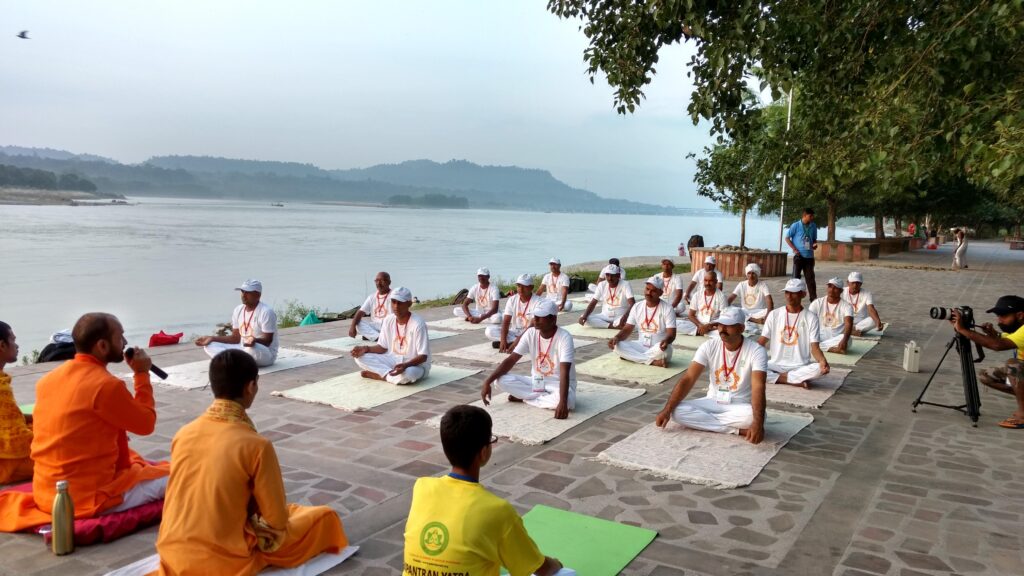Rupantaran Yatra: A Holistic Prison Reform Initiative
"Rupantaran Yatra," an initiative in the field of prison reform, was pioneered by Acharya ji, who crafted a 14-day comprehensive reformation program for jail inmates, centered around Vedic spiritual practices. This program aimed to bring about a profound transformation in the lives of inmates by addressing their core consciousness and spiritual well-being.
Concept and Objectives
Acharya Ji's vision was to utilize the ancient wisdom of Vedic spirituality to reform, reintegrate and rehabilitate the jail inmates, helping them break free from the psychological and emotional chains of their past. The core objective was to facilitate a deep, internal transformation that would pave the way for a more positive and reformed future.
Program Design
The program was meticulously designed to span 14 days, from September 21 to October 4, 2016. A group of 18 inmates, all convicted for heinous crimes and serving their sentences in Tihar prison, were carefully selected for this unique journey. The selection was based on their willingness to participate and their perceived readiness for change.
The Journey to Haridwar
The inmates were taken on a spiritual journey to Haridwar, a city renowned for its religious significance and spiritual ambiance. What made this journey remarkable was the decision to allow these inmates to travel without any police or jail staff accompanying them, signifying a bold leap of faith in the transformative power of spirituality and trust in the process.
Activities and Practices
Upon arrival in Haridwar, the inmates adopted a Gurukul lifestyle, living in an environment reminiscent of ancient Indian education systems that emphasized holistic development. The daily schedule included:
services
Activities and Practices
- Yoga Classes: Regular yoga sessions aimed at improving physical health, mental clarity, and emotional balance. These sessions were tailored to the needs of the inmates, focusing on stress relief, enhancing concentration, and promoting overall well-being.
- Religious Rituals: The inmates participated in various religious rituals, including the Upanayan Sanskar, a traditional Vedic ceremony symbolizing the initiation into spiritual knowledge. These rituals were designed to instill a sense of discipline, devotion, and respect for spiritual values.
- Satsang: Regular gatherings for spiritual discourse and singing of devotional songs. Satsang sessions created a sense of community, offering emotional support and fostering a collective spirit of transformation.
- Discourses on Vedic Wisdom: Acharya ji delivered discourses on Vedic wisdom, providing insights into ancient spiritual teachings and their relevance to modern life. These discourses aimed to help inmates confront and overcome the traumas of their past, facilitating emotional healing and personal growth.

Impact and Significance
The “Rupantaran Yatra” was groundbreaking, marking the first time in history that such a spiritual journey was undertaken for convicted inmates. The program’s holistic approach aimed to create a lasting impact on the consciousness of the participants, encouraging them to embrace positive change and rehabilitation.
The absence of police or jail staff during the journey underscored the program’s unique nature, highlighting a deep trust in the inmates’ commitment to their transformation. This aspect also aimed to reinforce the inmates’ sense of responsibility and self-worth, essential elements for their successful reintegration into society.
In summary, “Rupantaran Yatra” stands as a pioneering model in prison reform, demonstrating the profound potential of Vedic spiritual practices in fostering deep, meaningful change in the lives of inmates. Through a blend of yoga, religious rituals, satsang, and Vedic wisdom, the program sought to heal and uplift, offering a path to redemption and a renewed sense of purpose.